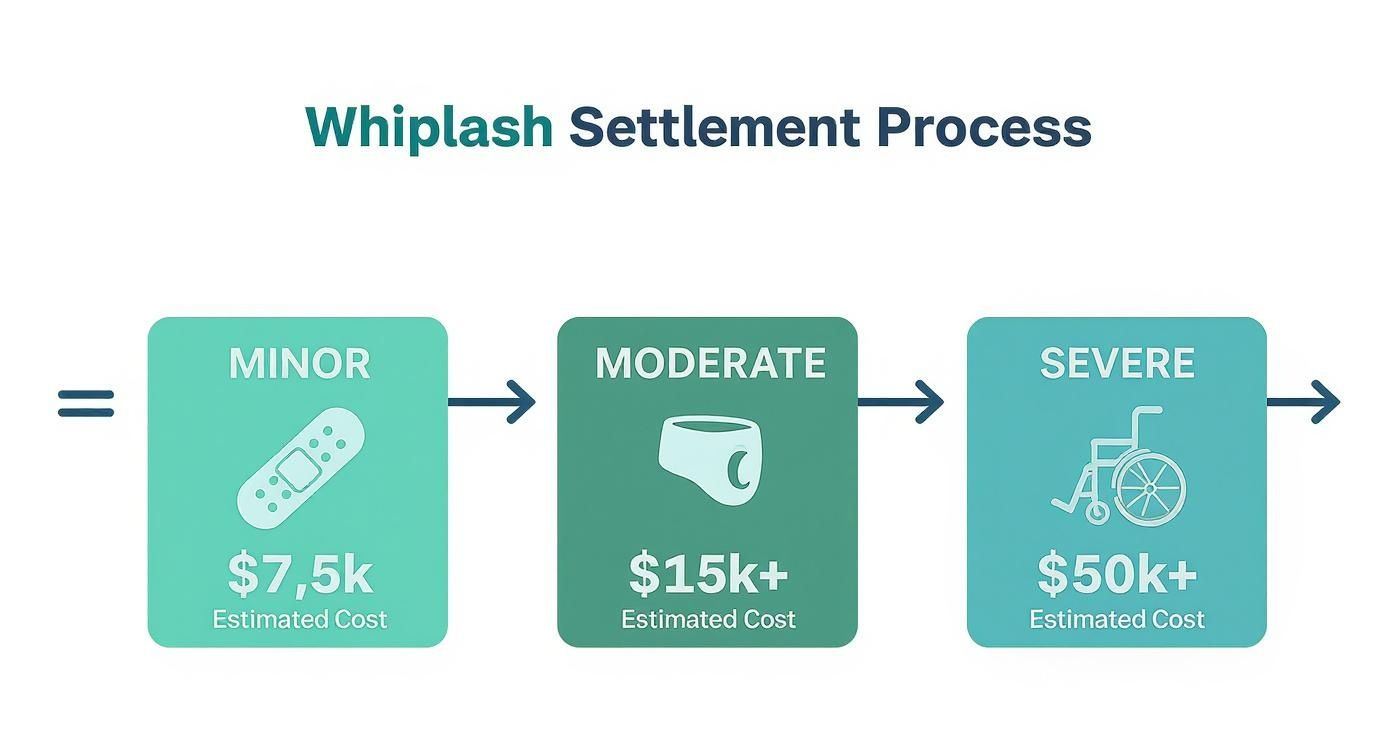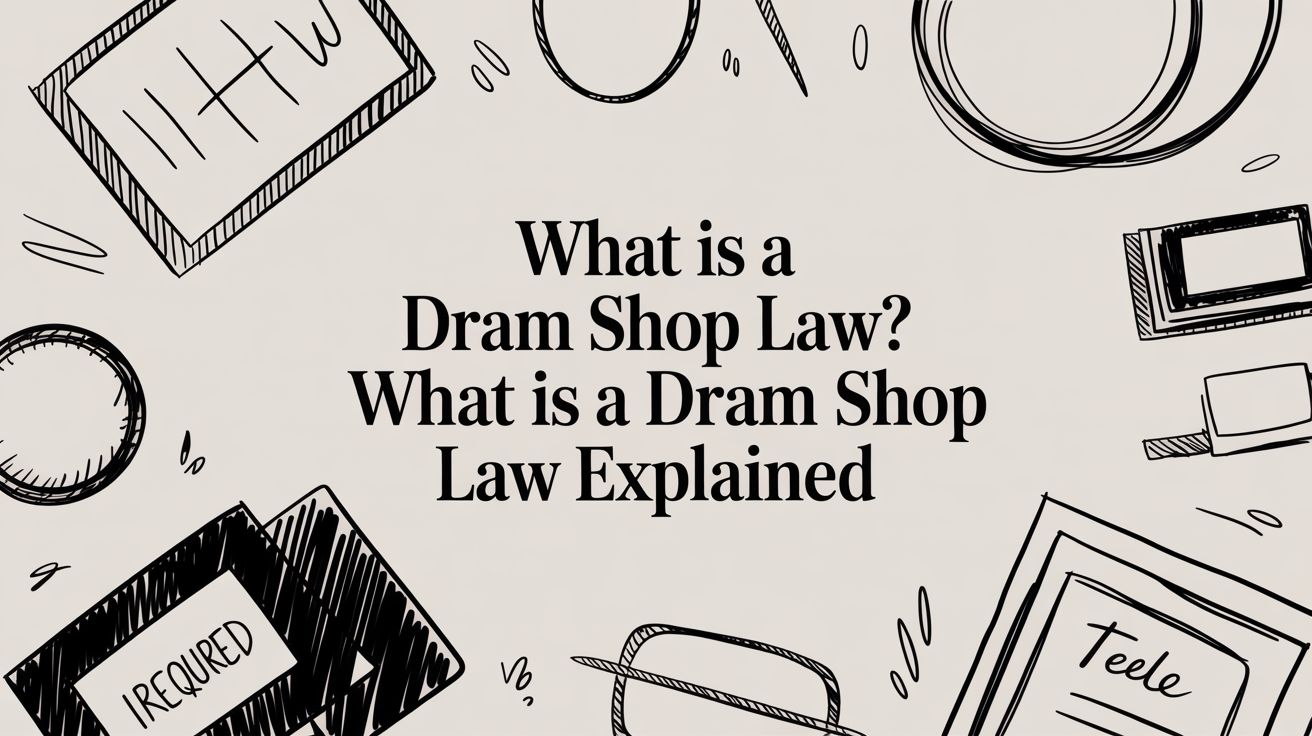A serious accident can change your life in seconds — but you don’t have to face it alone. If you've been injured because of someone else's negligence, securing a fair settlement for whiplash is a critical step toward rebuilding. This isn't just about a check; it's the financial support you need to cover your medical bills, lost income, and the personal toll the injury has taken, allowing you to focus on recovery.
What a Whiplash Settlement Should Truly Cover
You shouldn't have to carry the financial burden of an accident you didn't cause. Under Texas personal injury law, the goal of compensation is to make you "whole" again, at least from a financial standpoint. This means your settlement needs to address every single loss you've suffered because of the other driver's carelessness.
For instance, after a Houston freeway crash, a fair settlement won't just cover your initial emergency room visit. It should also account for ongoing physical therapy, the income you lost while out of work, and the emotional toll that comes with living in chronic pain. It’s a complete recovery package, and understanding what goes into it is the first step toward reclaiming your life.
Economic Damages: The Tangible Costs of Your Injury
The most straightforward part of any whiplash settlement involves economic damages. These are the concrete, measurable expenses that are directly tied to your accident. Think of them as the receipts and bills that have been piling up since the crash. A proper settlement must cover not just what you've already paid, but what you'll need for your future recovery, too.
Your economic damages should include:
- Medical Expenses: This covers everything—the ambulance ride, hospital bills, imaging like X-rays and MRIs, chiropractic adjustments, prescriptions, and physical therapy.
- Lost Wages: If your injury kept you from your job, you're entitled to the income you missed out on. This isn't just salary; it includes hourly wages, bonuses, and even lost freelance opportunities.
- Future Lost Earning Capacity: If your whiplash leads to a long-term or permanent issue that affects your ability to earn a living down the road, your settlement must compensate you for that future loss.
When you're thinking about what a whiplash settlement should cover, it’s vital to include the therapies and strategies you'll need to get better, including effective methods for muscle pain relief that you can even manage at home. These ongoing needs are a crucial part of your financial recovery.
Non-Economic Damages: The Personal Impact of Your Pain
While economic damages are all about the numbers, non-economic damages are about the profound, personal ways the injury has affected your life. These losses are harder to put a price tag on, but they are just as real and just as compensable under Texas law. They acknowledge that your suffering goes far beyond the medical bills.
A whiplash injury isn't just a physical ailment; it's a disruption to your entire life. It can affect your ability to enjoy hobbies, care for your family, and simply live without pain. Texas law recognizes this human cost, and your settlement should reflect it.
Common non-economic damages include:
- Pain and Suffering: This is compensation for the physical pain and discomfort you've had to endure and may continue to live with.
- Mental Anguish: This covers the emotional fallout—the anxiety, depression, stress, and sleepless nights that so often come with a painful injury and a long recovery.
- Physical Impairment: If your injury stops you from doing things you once loved, like playing sports, gardening, or picking up your kids, this damage category provides compensation for that loss.
Insurance companies often try to downplay these "invisible" injuries, but they are a legitimate and significant part of what you're owed. The table below breaks down the different types of compensation you can pursue.
| Types of Compensation in a Whiplash Claim |
| :— | :— | :— |
| Type of Damage | What It Covers | Real-World Example |
| Economic Damages | Measurable, out-of-pocket financial losses from the accident. | The $5,000 bill from your emergency room visit, $2,400 in lost wages from missing work for three weeks. |
| Non-Economic Damages | Intangible losses related to the quality of life and emotional impact. | Compensation for chronic neck pain that prevents you from playing golf or the anxiety you feel when driving. |
| Punitive Damages | Additional compensation meant to punish the at-fault party for extreme negligence. | A drunk driver with a history of DUIs causes your accident; the court may award punitive damages to punish this reckless behavior. |
Understanding both the visible and invisible costs is key to securing a fair outcome.
At The Law Office of Bryan Fagan, PLLC, our experienced Texas personal injury lawyers make sure that every cost—both on paper and in your personal life—is fully accounted for. We fight to secure a settlement that honors the true scope of your losses so you can focus on what really matters: your healing.
Key Factors That Drive Your Settlement Value

Insurance companies don't just plug numbers into a simple calculator to determine what your whiplash claim is worth. Instead, they—and our attorneys—dig into several critical factors that, together, paint a full picture of your injury and how it's impacted your life.
Knowing what these factors are is the first step in building a strong claim and fighting for the compensation you deserve.
One of the most important factors is the strength and consistency of your medical records. Seeking medical attention right after a crash isn't just about your health; it's about creating an official paper trail that links your injuries directly to the collision.
If there are significant gaps in your medical care, it sends a red flag to the insurance adjuster. They may argue that if you weren't actively seeking treatment, your injuries couldn't have been that serious. This is why it is absolutely essential to follow your doctor’s orders and attend all your follow-up appointments.
The Power of Detailed Medical Evidence
Your medical records are the bedrock of your whiplash claim. These documents offer objective, undeniable proof of your injuries, the treatment you've received, and what your doctor expects for your recovery. Simply complaining of "neck pain" isn't enough; a strong claim is built on solid, detailed evidence.
The most convincing pieces of evidence usually include:
- Diagnostic Imaging: Things like X-rays, MRIs, and CT scans can show the real damage to your vertebrae, discs, and ligaments that you can't see from the outside.
- Physician's Notes: The detailed notes from your doctor visits create a timeline of your symptoms, track how your treatment is progressing, and provide a professional medical opinion on your condition.
- Physical Therapy Records: These records are proof of your commitment to getting better. They also document your physical limitations and show your progress over time. We actually have a great resource on how physical therapy can increase a settlement if you want to learn more.
Let's put it in real-world terms. Imagine you were rear-ended in a major truck crash on I-45 in Houston. A claim supported by an MRI showing a herniated disc and six months of consistent physical therapy notes will always be valued much higher than a claim with just a single emergency room visit. Your records tell the story of your pain and suffering in a language the insurance company simply can't ignore.
Documenting Your Financial and Personal Losses
Beyond the medical proof, the total value of your financial losses and personal suffering directly impacts your settlement amount. This means you need to be meticulous, tracking every single expense and loss that came from the accident.
The total of your medical bills is often the starting point for calculating your settlement. This includes everything—the ambulance ride, the ER visit, your physical therapy, and even potential future surgeries. Keep every single bill, receipt, and explanation of benefits.
Lost wages are another massive piece of the puzzle. If your whiplash injury made you miss work, you have a right to be compensated for that lost income. And it’s not just about your base salary or hourly wage; it also covers any missed overtime, bonuses, or commissions you would have otherwise earned.
The longer your recovery takes and the more it interferes with your ability to work and live your life, the higher the potential value of your claim. It’s a direct reflection of the severity of the accident's impact.
When you're looking at long-term recovery, the costs can really add up. Sometimes this includes specialized equipment or ongoing therapies. For example, if you have to investigate options for a hyperbaric chamber for home use, those significant costs become a key factor in your final settlement calculation.
Establishing Clear Liability
Finally, how clearly fault is established plays a huge role. In Texas, a negligent (or at-fault) driver is responsible for the damages they cause. A straightforward case—like a rear-end collision where the other driver was ticketed for texting—makes it incredibly difficult for their insurance company to argue about who is liable.
But if fault is disputed, Texas's comparative responsibility laws come into play. If you're found to be partially at fault for the crash, your settlement gets reduced by your percentage of blame. This is precisely why having a skilled Houston car accident attorney to investigate the crash, gather the right evidence, and prove the other driver's fault is so important.
Realistic Whiplash Settlement Ranges in Texas
It’s often the first question on everyone's mind after a crash: "What is my whiplash case actually worth?" While there's no magic formula, looking at typical settlement ranges can give you a clearer perspective on what to expect. Just remember, these are benchmarks, not guarantees. Your final settlement will always depend on the specific details of your injury and the strength of your evidence.
The value of a settlement for whiplash is directly tied to the factors we've already covered—the clarity of your medical records, the total of your economic and non-economic damages, and whether the other driver’s fault is undisputed. Each piece helps tell the story of how this accident has impacted your life.
Minor to Moderate Whiplash Settlements
Let's start with a minor whiplash injury. This might involve neck stiffness and headaches that resolve within a few weeks or months after some chiropractic visits or a short round of physical therapy. In these situations, settlements often land in the $7,500 to $15,000 range. This amount is meant to cover your medical bills, any income you lost during that initial recovery, and a reasonable sum for your pain and suffering.
A moderate injury is a step up. We're talking about more persistent pain, a longer physical therapy plan, or the need for an MRI to diagnose the issue. When recovery takes several months and the injury has a more significant impact on your daily life, settlements can climb into the $15,000 to $30,000 range. The key here is consistent medical documentation that proves the injury has lingered and required ongoing treatment.
These figures align with national trends. A 2025 survey of law firms revealed that U.S. whiplash settlements typically range from $7,500 to $50,000, with an average around $18,950. You can discover more insights about these settlement averages on consumershield.com. This data reinforces why every piece of evidence is so important for your Texas claim.
Severe and Long-Term Whiplash Cases
When a whiplash injury is severe, the potential settlement value increases significantly. These are the cases that go far beyond a simple neck strain. They usually involve complications that leave a lasting, sometimes permanent, impact on your health and well-being.
A severe whiplash claim isn't just about pain—it's about a fundamental change in your quality of life. The settlement must reflect the long-term physical, emotional, and financial support you'll need to move forward.
So, what does a severe whiplash case look like? We're typically seeing one or more of these issues:
- Herniated or Bulging Discs: This is damage to the spinal discs that might require injections, serious pain management, or even surgery.
- Chronic Pain Syndrome: This involves persistent, debilitating pain that lasts for more than six months and impacts your ability to work or live your life normally.
- Nerve Damage (Radiculopathy): This causes radiating pain, numbness, or weakness down the arms and into the hands because of compressed nerves in the neck.
- Long-Term Medical Care: This means you’re looking at ongoing physical therapy, visits to pain management specialists, or even future medical procedures.
In these situations, a settlement could easily pass $50,000, and in catastrophic injury cases, it can absolutely reach six figures. The final amount hinges heavily on the projected costs of your future medical care and the extent to which your ability to earn a living has been impacted.
It’s also worth noting that the type of accident can shape settlement expectations. For example, rear-end collisions often lead to clear liability, which can make the claims process more straightforward. You can learn more in our guide on typical rear-end collision settlement amounts.
Ultimately, these ranges show exactly why a professional evaluation from an experienced Texas personal injury lawyer is so crucial. We can analyze the specifics of your case, gather all the necessary evidence, and build a powerful argument to make sure you’re pursuing the maximum compensation you rightfully deserve.
A Practical Roadmap for Your Injury Claim
After a sudden, violent crash, knowing what to do next can feel overwhelming. You're in pain, your mind is racing, and the last thing you want to think about is paperwork and phone calls. This practical roadmap is designed to give you clear, practical advice, helping you protect your rights and build a strong foundation for your whiplash claim.
The first few moments after an accident set the stage for your entire case. Your top priority is always your health. Get medical attention right away, even if you think your injuries are minor. Some whiplash symptoms don’t show up for hours or even days, and a doctor’s visit creates an official record that directly links your injuries to the collision. At the same time, make sure the accident is reported to the police so an official report can be filed—it’s a key piece of evidence.
What to Do After an Accident: Gathering Your Evidence at the Scene
Once you've made sure everyone is safe and help is on the way, the evidence you can collect at the scene is invaluable. If you're physically able, use your phone to take pictures and videos of everything.
Snap photos of the position of the cars, the damage to both vehicles, any skid marks on the road, and relevant traffic signs or signals.
You should also:
- Get Witness Information: If anyone saw what happened, ask for their name and phone number. An independent witness can be incredibly powerful in proving who was at fault.
- Exchange Information: Get the other driver’s name, contact details, driver's license number, and their insurance policy information. Avoid discussing fault or apologizing; just stick to the facts.
- Note the Details: Jot down the time, location, and weather conditions. Every small detail helps paint a clearer picture.
How to Handle Insurance Companies: Navigating Conversations
It won't be long before you get a call from the other driver's insurance adjuster. This is a conversation you need to handle with care. The adjuster’s job is to protect their company’s bottom line, which means paying you as little as possible for your whiplash settlement.
Give them only basic information, like your name and contact details. You should politely decline to give a recorded statement until you've had a chance to speak with an attorney. Those statements can be twisted and used against you later to devalue or even deny your claim. You are in control of the information you share.
Here’s a quick guide on what to say—and what not to say.
Do's and Don'ts When Speaking to an Insurance Adjuster
| Action | Why It Matters for Your Claim |
|---|---|
| DO provide your name, address, and phone number. | This is basic identifying information they need to open a file. |
| DON'T give a recorded statement without a lawyer. | Adjusters use these to find inconsistencies and undermine your credibility. |
| DO state where and when the accident happened. | Stick to objective facts that are already in the police report. |
| DON'T discuss your injuries in detail. | Simply say, "I'm still under medical care." Your condition may evolve. |
| DO get the adjuster's name, number, and claim number. | Keep a clear record of every conversation. |
| DON'T sign any medical release forms or waivers. | This gives them broad access to your entire medical history, not just crash-related care. |
| DON'T accept the first settlement offer. | It's almost always a lowball tactic designed to close the claim quickly and cheaply. |
Remember, your words can have a huge impact on the outcome of your case. Being cautious now can prevent major headaches later.
The infographic below shows how the severity of your injury can impact typical settlement ranges.

As you can see, a settlement has to line up with the true severity of your injury, which is why protecting your claim from day one is so important.
The Negotiation Process
Once you've completed your initial medical treatment, the negotiation phase begins. The first offer the insurance company makes is almost always a lowball offer. It's a tactic to see if you’ll accept a quick, cheap payout. Don't be discouraged—it's just the start of the negotiation process.
This is where having a skilled negotiator on your side becomes essential. A Houston car accident attorney can gather all your medical records, proof of lost wages, and other evidence into a powerful demand package. They will handle all communications with the adjuster, push back against low offers, and fight for a settlement that actually covers all your losses. If you want to dive deeper into this part of the journey, our guide on how to negotiate a personal injury settlement offers some valuable insights.
Your focus should be on healing, not on battling an insurance company. Having a legal advocate allows you to step back and trust that your financial recovery is in capable hands.
Whether you were injured in a passenger car accident, a devastating truck crash, or suffered a catastrophic injury, these steps are your foundation. Following this roadmap helps ensure you are in the strongest possible position to get the fair compensation you need to move forward.
How Long Do You Have to File a Claim in Texas?
When you're dealing with a whiplash injury, the last thing you want to worry about is legal jargon. But here in Texas, a couple of specific rules can make or break your claim. Understanding them is the best way to protect your right to fair compensation.
Two of the most important are the statute of limitations and the state's comparative responsibility rule. Let’s break down what these mean for you in a real-world whiplash case.
The Two-Year Statute of Limitations in Texas
Texas law puts a strict deadline on your right to file a personal injury lawsuit. This is called the statute of limitations, and for accidents causing injuries like whiplash, you have exactly two years from the date of the accident to file a claim.
That might seem like plenty of time, but it disappears quickly. Between doctor's visits, physical therapy, and trying to get your life back on track, that two-year mark can sneak up on you.
If you miss that deadline—even by a single day—your case is over. The court will almost certainly dismiss it, and you will lose your right to recover any compensation, forever. This is why it’s so important to speak with a Texas personal injury lawyer as soon as possible. An attorney can get the process started and preserve critical evidence before it's lost.
Understanding Comparative Responsibility in Texas
Here's where things can get tricky. Texas uses a rule called comparative responsibility (also known as comparative fault). This law comes into play when the other driver's insurance company tries to argue that you were also partially to blame for the crash.
The rule works with percentages. A judge or jury looks at the facts and assigns a percentage of fault to everyone involved. Your final settlement is then reduced by whatever percentage of fault is assigned to you.
For example, imagine you are in a wreck in Houston and are awarded $50,000 for your whiplash claim. If the jury decides you were 20% at fault—perhaps you were slightly over the speed limit—your $50,000 award would be reduced by that 20% ($10,000), leaving you with $40,000.
But there's a critical catch: the "51% bar rule." Under Texas law, if you are found to be 51% or more at fault for the accident, you are barred from recovering any compensation. You get nothing.
This is exactly why insurance adjusters fight so hard to shift blame. They know every percentage point they can pin on you saves their company money and gets them closer to that 51% cutoff where they owe you nothing at all. This rule is one of the most compelling reasons to have a dedicated Houston car accident attorney or truck crash lawyer Houston in your corner. We know how to gather the evidence needed to shut down these unfair blame games and prove the other driver was the one at fault.
When to Call a Lawyer After an Accident
Figuring out what to do after a car wreck is tough enough without having to go toe-to-toe with an insurance company. For a minor fender-bender with no injuries, you might be able to handle things on your own. But when certain issues arise, it’s a clear signal that you need a professional on your side.
Calling a lawyer isn't about being confrontational. It's about leveling the playing field. Many people wait, thinking their case isn't "serious enough" for an attorney. But remember, insurance companies have teams of professionals working to pay out as little as possible. An experienced advocate makes sure your voice is heard and your rights are protected from start to finish.
Recognizing the Red Flags
You should treat certain actions from the insurance company as immediate warning signs. These are common tactics used to push you into accepting a settlement that's far less than what you deserve. If you encounter any of these, it's time to call a Texas personal injury lawyer.
You should seriously consider getting legal help if:
- They Dispute Who's at Fault: If the other driver’s insurer starts blaming you for the crash—even a little bit—your entire settlement is in jeopardy. A lawyer can step in to gather the evidence needed to prove the other driver was negligent.
- You Get a Fast, Lowball Offer: Insurers often make a quick offer, sometimes just days after the accident. This is a strategy. They want you to take the money and sign away your rights before you even know the full extent of your injuries or future medical costs.
- They Ask for a Recorded Statement: This is a classic trap. An adjuster will try to get you on record so they can twist your words and use them against you later. Your attorney should handle all communications with the insurer to protect you.
- Your Injuries are Serious or Need Long-Term Care: If your whiplash diagnosis involves herniated discs, chronic pain, or requires months of physical therapy, the future costs will be significant. An attorney ensures those future medical needs are properly calculated and included in your demand. This is especially true in cases of wrongful death or catastrophic injury, where the stakes are highest.
The Advantage of Having a Legal Advocate
Hiring a lawyer is about more than just fighting back against insurance company tactics. A dedicated Houston car accident attorney takes over the entire claims process, which frees you up to focus on what truly matters: your physical and emotional recovery.
Your legal team will handle everything from investigating the crash and gathering your medical records to calculating your total losses and negotiating aggressively with the insurance company. This comprehensive support is critical for securing a settlement for whiplash that truly covers everything you’ve been through.
The decision to hire a lawyer is a strategic move to secure your future. It ensures that a professional who understands Texas law is fighting to protect your financial stability while you focus on healing.
This becomes even more important in complicated cases, like those involving commercial vehicles. A truck crash lawyer Houston has the specific experience needed to deal with the complex federal regulations and multiple layers of insurance that are almost always involved in these claims.
You Pay Nothing Unless We Win Your Case
We understand that the last thing you need after an accident is another bill to worry about. At The Law Office of Bryan Fagan, PLLC, we work on a contingency fee basis.
What does that mean for you? It means you pay absolutely nothing upfront. There are no retainers, no hourly bills, and no out-of-pocket costs. We only get paid if we win your case by securing a settlement or a court award.
This approach removes the financial risk from your shoulders. You can get top-tier legal representation without worrying about your current financial situation. Our goals are perfectly aligned with yours: getting you the maximum compensation possible for your injuries.
A serious accident can change your life in an instant—but you don’t have to go through it alone. Our team is here to offer the experienced and compassionate legal help you need to move forward. We invite you to contact us for a free, no-obligation consultation to talk about your case. Let us show you how we can fight for the justice and peace of mind you deserve.
Whiplash Claim Questions We Hear All The Time
If you're dealing with the aftermath of a car accident, you probably have a lot on your mind. Here are some straightforward answers to the questions we hear most often from people in your exact situation.
Will I Have to Go to Court for a Whiplash Settlement?
Most likely not. The good news is that the vast majority of whiplash claims—and personal injury cases in general—are resolved outside of a courtroom. A fair settlement is usually reached through focused negotiations between your lawyer and the at-fault driver's insurance company.
Filing a lawsuit typically only happens if the insurance company refuses to offer a fair settlement that covers your losses. Even when a lawsuit is filed, most cases still settle long before a trial ever begins.
How Long Does It Take to Get a Whiplash Settlement in Texas?
This is a tough question because the timeline can vary significantly depending on your specific situation. A straightforward case with minor injuries might be resolved in just a few months.
However, a more complex claim involving severe injuries or a dispute over fault could take a year or more to resolve. Our priority is always to get you a full and fair settlement, not just a fast one. We won't let the insurance company rush you into closing your claim before we understand the full extent of your injuries and what you'll need for the future.
Can I Still Get a Settlement if the Crash Was Partially My Fault?
Yes, absolutely. As we discussed, Texas law allows you to recover damages as long as you were not 51% or more at fault for the collision. We operate under a "comparative responsibility" rule.
This just means your final settlement will be reduced by whatever percentage of fault is assigned to you. For example, if you were found to be 10% responsible, your total recovery would be reduced by that 10%. A good Houston car accident attorney will fight to protect you from the insurance company trying to pin unfair blame on you to reduce their payout.
A serious accident can change your life in a heartbeat—but you don’t have to face the fallout alone. Recovery is possible, and legal help is available. At The Law Office of Bryan Fagan, PLLC, our team has the experience to provide the compassionate guidance you need and the aggressive representation you deserve. Getting back on your feet is our priority.
Schedule Your Free Consultation with The Law Office of Bryan Fagan, PLLC to learn how we can fight for you.








